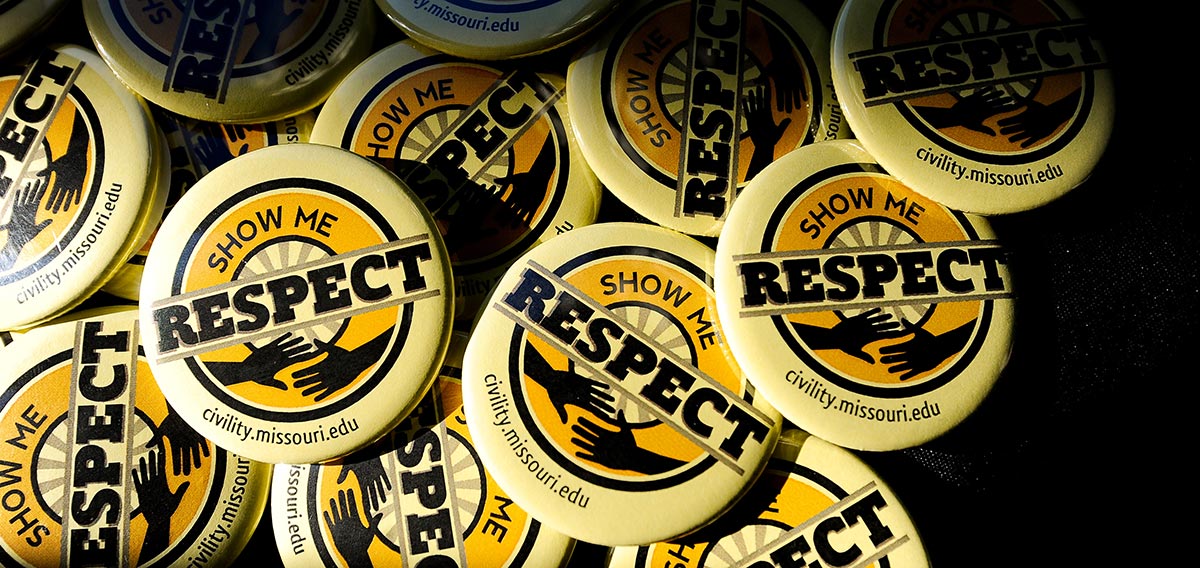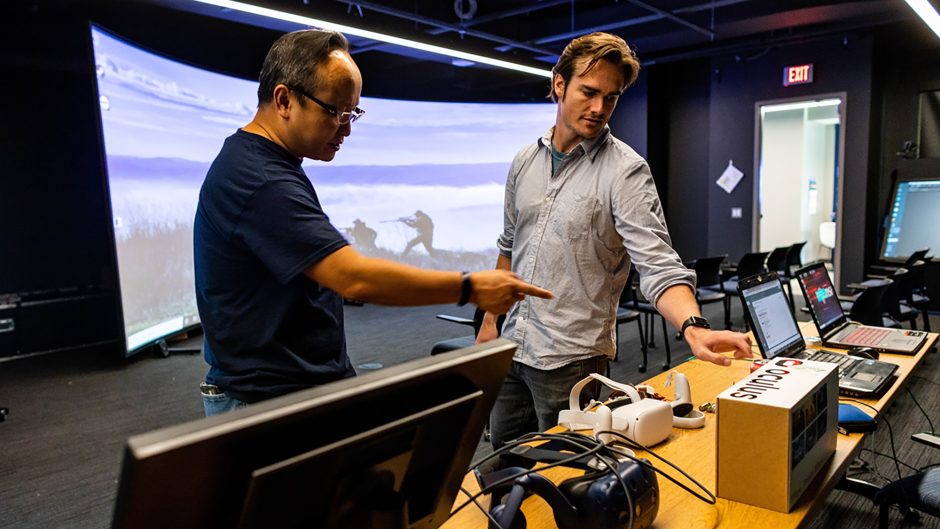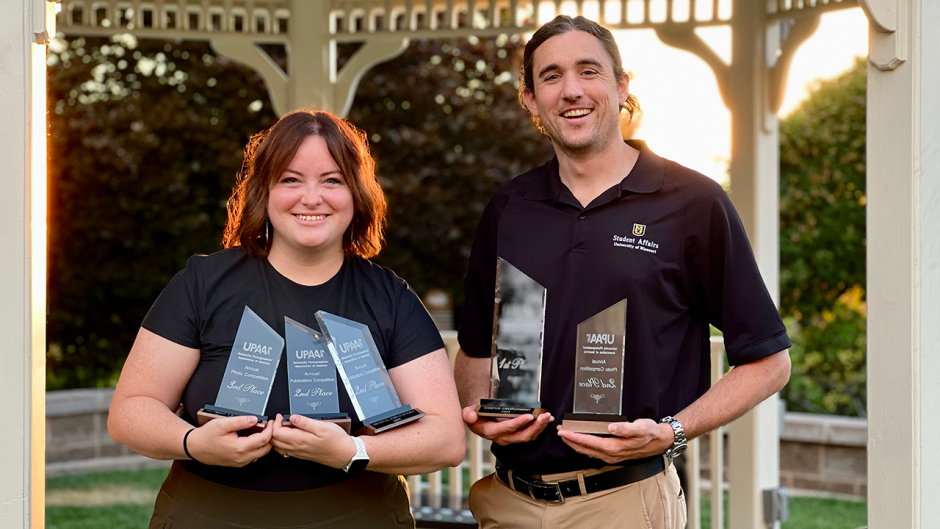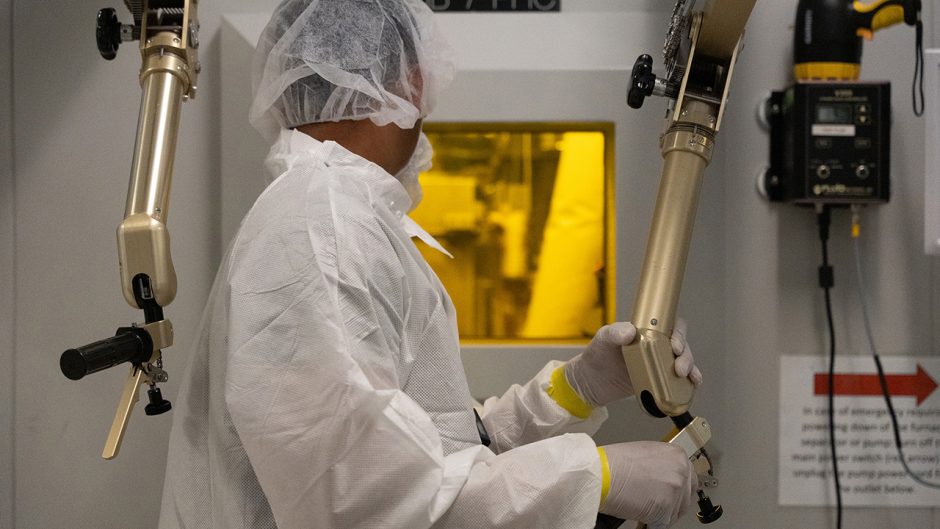University life can be stressful for all, from students and faculty to staff and administrators, and something as uncomplicated as a small sign of encouragement means a lot.
Through surprise acknowledgements for random acts of kindness, MU’s Yellow Button Project encourages caring behavior. It’s a fun project. Experiencing the kindness of a stranger or a colleague is pretty sweet, no matter where it happens and even if it’s a bit silly.
At the same time, this is serious business.
“As an educational institution, we have an opportunity — and an obligation — to get people thinking about how to change our culture to be more welcoming and inclusive,” says Noel English, director of MU Equity, who oversees the project
Perhaps the best way to demonstrate the humanity of encouraging small kindnesses is the story behind Sheila’s Yellow Button.
Like other staff and administrators at the Reynolds Alumni Center, Sheila had greeted Wynn at the Turner Avenue Garage as he handed out weekly advertising fliers. Wynn was not a Mizzou employee, but he was a Wednesday regular on campus for years. After his mother died, Wynn had to leave his long-time job and move to another city to live with relatives.
Sheila simply took the time to care. Knowing the change would be hard on Wynn, she initiated a collection at the Alumni Center to buy him a sympathy card and a gift card to help him “settle in.”
And Sheila now has a Yellow Button that she must pass on to someone else.
Pay it forward
A steering committee of members representing the chancellor’s staff as well as Staff Advisory Council, Faculty Counciland the Missouri Students Association initiated the Yellow Button project. The committee members opted to combat incivility on campus by encouraging decent human behavior and reminding all Mizzou citizens of what they already know about being polite and kind.
“We were looking for ways to accentuate the positive. It’s a pretty simple concept. You just want to thank people and pay attention to the nice things going on here,” English says.
Chancellor Brady Deaton received the first Yellow Button and awarded it to a student for working as a volunteer on a Mizzou Week project.
Show-Me Respect shares other Yellow Button stories online.
Who’s got the buttons?
Sometimes the acts of kindness take little effort. Yellow Buttons have been bestowed on Mizzou’s citizens for such actions as helping someone carry a big load of books or for picking up trash to keep the campus beautiful. The buttons have thanked a student for assisting at a study session. They have recognized staff for providing comic relief, mentoring students and showing concern for a co-worker who didn’t feel well.
Occasionally Yellow Buttons reward complex actions that take planning or sacrifice. Medical students are some of the busiest on campus, yet Woody went out of his way to chair a Student Town Hall meeting.
Some of the stories are reflections of a big heart. Heather, for example, took a bag of groceries to a student who had no food. Staff member Ashley baked cupcakes to celebrate a student worker’s birthday; staff member Lisa bought lunch one day for a faculty member who had forgotten her wallet; and faculty member Angie filled in at the Extension Office when no one was available.
In an example of going the distance, Sean earned a button after helping a fellow student who was experiencing car trouble off campus. Sean not only provided jumper cables to start Chris’s car, he then drove Chris to a store to buy a new battery.
One good turn …
It’s hard to open a newspaper without reading about the lack of respectful dialogue in Washington, about cyber bullying that leads to suicide or about other significant issues that arise due to lack of respect for others.
“Mizzou is a microcosm of the greater society, and, unfortunately, incivility happens here, too. Our goal is to make respect and civility the norm, and to make it okay for people who are having a problem to speak up,” English says.
In her day-to-day job, English focuses on dealing with complaints of bias, discrimination and harassment on campus. In a complete reversal of those responsibilities, she’s delighted to lead a project that accentuates the positive and can “produce a ripple effect on people.”
The idea of publicly rewarding kindnesses with the presentation of a Yellow Button grew into a campaign after many of the first 100 buttons were distributed among attendees of the October Chancellor’s Diversity Summit. Attendees left that meeting with the directive to give away their buttons.
The Yellow Button project is just a small part of Mizzou’s multi-tiered Chancellor’s Diversity Initiative. Show Me Respectoffers common-sense tips designed to raise awareness of respectful behavior and to discourage incivility on campus.
“There are all sorts of conversations we should have,” English says of potential topics to be covered. What constitutes bullying is at the top of her list.
Civility in the classroom is another topic English wants as a campus conversation, including a potential discussion on the appropriateness of using cell phones and laptops.
Often overlooked in civility conversations are the daily interactions among faculty and staff. English describes MU faculty-staff interactions as “usually lovely” but says sometimes there’s a class divide between the two groups that should be discussed. Needs of university staff members have to be considered, English says.
Resolving to do good
English reports that more buttons are in demand, and she hopes the Yellow Button project will encourage resolutions of good deeds in the New Year. Not a big deal, you say? English is betting that all those students, faculty and staff members who receive or give a button will remember the kindness behind the experience.
“It’s disingenuous to say we learned this in grade school and shouldn’t have to learn it here,” English says. “We may not have to learn it now, but we sure do need to be reminded.”





